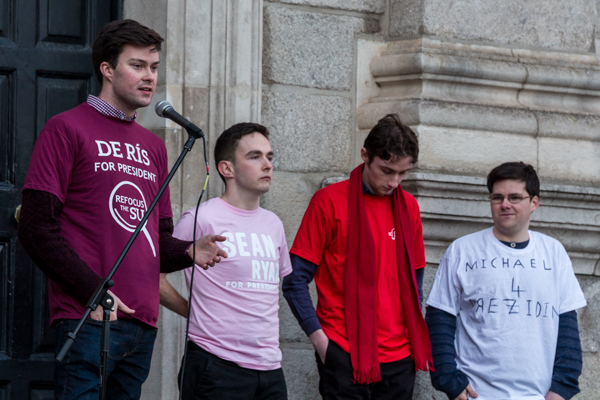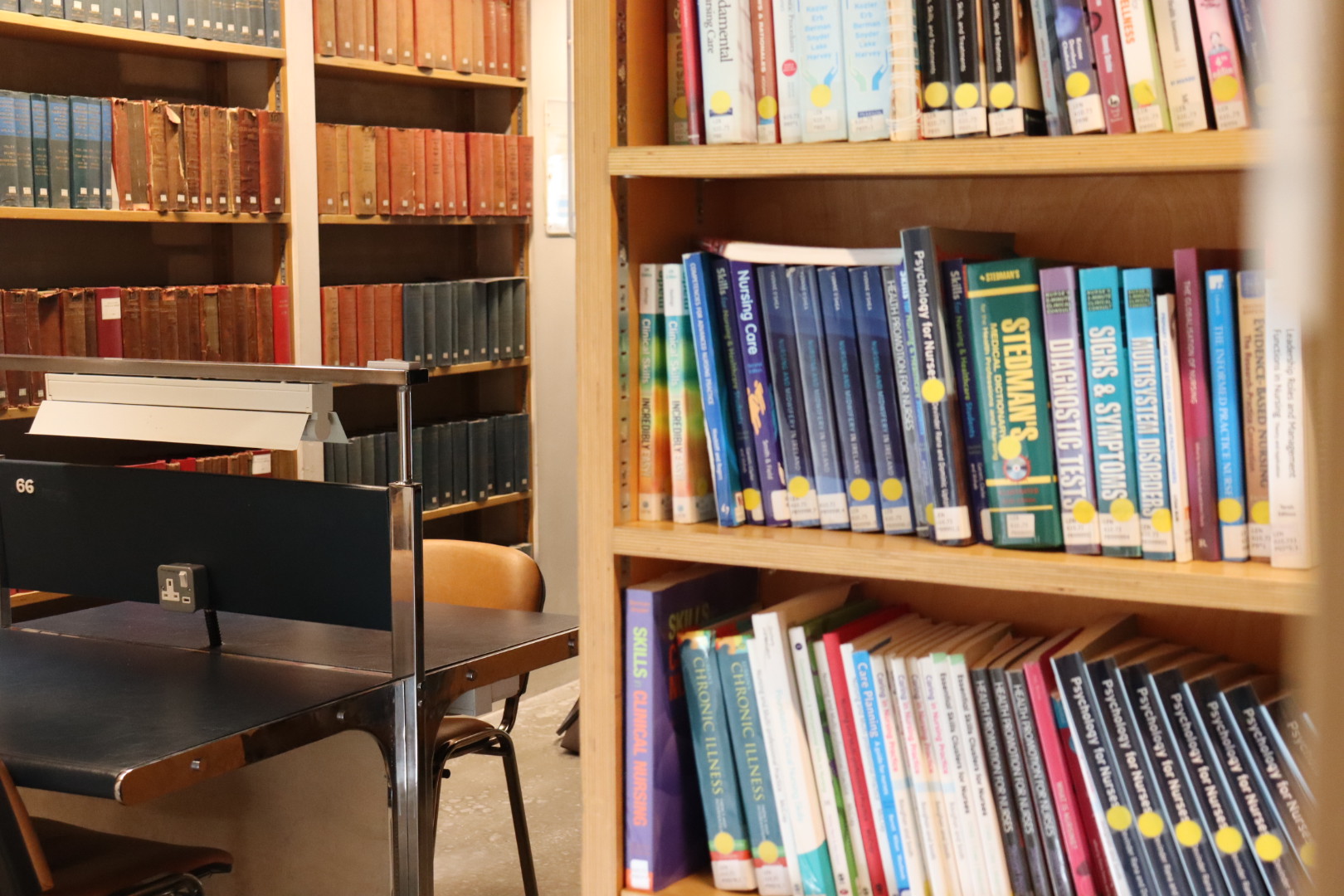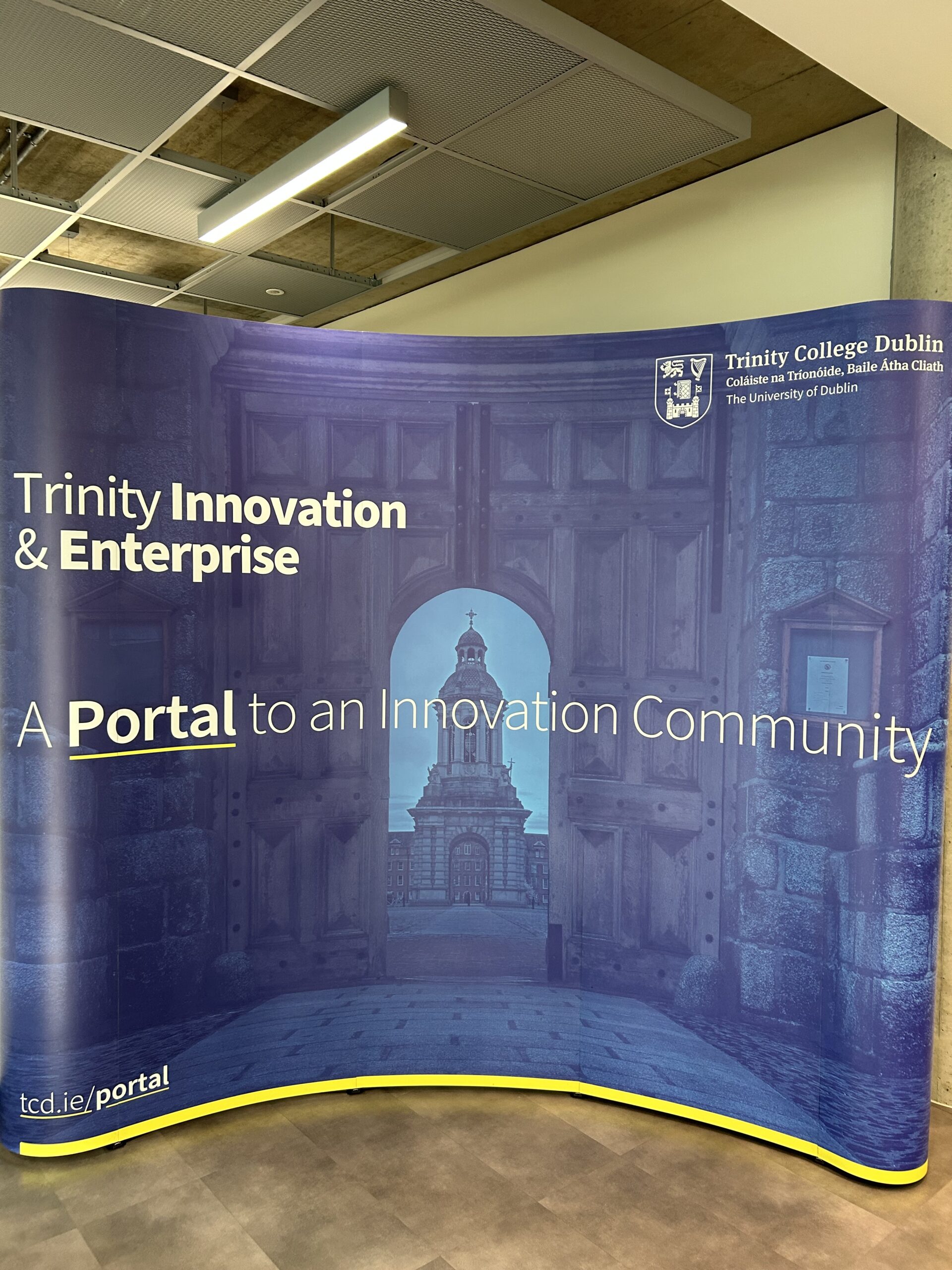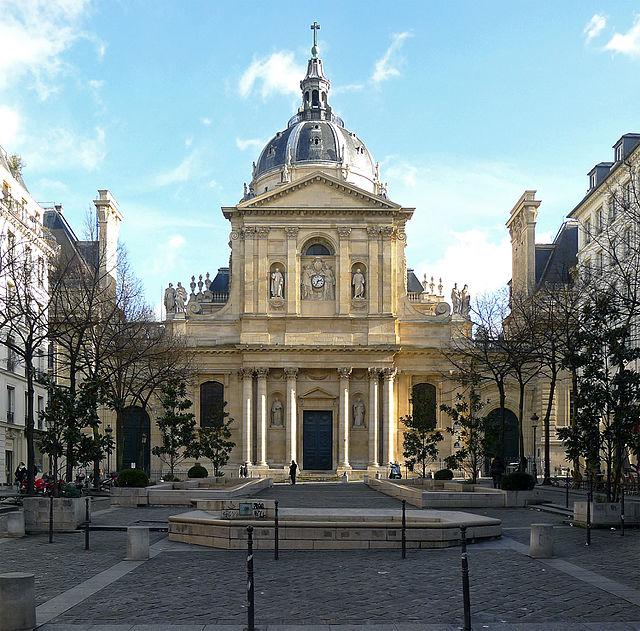If there was little to separate presidential candidates at hustings today, there were also few shocks or surprises as candidates played it straight, pitching themselves as the best man to lead Trinity College Dublin Students’ Union (TCDSU) into the future.
Despite a return to Dining Hall Hustings, in the hopes of boosting engagement, the hustings still failed to draw more of a crowd beyond candidates and campaign teams.
President
In speeches which often seemed heavier on rhetoric than policy, Paul Molloy and Shane De Rís tried to let their reputations precede them, while Ryan stressed his own experience overcoming his disability as the reason he understood the role the students’ union should play in the lives of students.
In freezing conditions, candidates focused on areas familiar to anyone paying attention to student politics in recent years: accessibility, affordability and inclusivity. Notably, there was little sense of a divided focus between national and local issues, with all candidates promising to return the union to the ordinary student.
If Michael McDermott – whose speech, full of quips and gags, cemented his status as something of a joke candidate – told students that he wasn’t presidential, the other three candidates tried to set out a vision for a union facing a conflicted student population and a shrinking deficit.
De Rís, leaning heavily on his past experience, said he hoped to emphasise day-to-day issues faced by students. “The primary focus is to improve the students’ lives”, De Rís said. He was questioned persistently by an unsatisfied audience member on his plans for disabled students, stressing in response the role of the Disabilities Officer.
Both Molloy and Ryan made much of their lack of union experience, with the former stressing his experience as Auditor of the College Historical Society. Molloy tried to pitch himself as someone capable of fighting back against College, pointing to previous battles with the Examinations Office, while Sean Ryan did not deviate hugely from the tried-and-trusted themes of accessibility and engagement.
Ryan referenced his own disability to demonstrate the importance of accessibility. He pointed to House Six, the headquarters of TCDSU, as an area on campus that “is not completely accessible”. For Molloy, student issues are important, quite simply, “because I’ve lived them”.
Communications & Marketing
With very different backgrounds, it was perhaps unsurprising that the three communications and marketing candidates differed greatly in their speeches, using arguments often diametrically opposed in an attempt to garner support.
Niall Harty attempted to make a virtue out of his lack of experience in the union. Instead, he focused on his “professional marketing experience”, pitching private sector experience as somewhat more meaningful than a position in TCDSU.
McLean, on the other hand, outlined his extensive union experience and history of engagement. Unsurprisingly, the first thing Rynne mentioned was his Trinity College Doggos Facebook page, continuing the theme of drawing on experience to entice voters.
McLean delivered a very polished speech, but Rynne, speaking without a script, which he ripped up before beginning his speech, came across as a well-prepared candidate. He stressed the value of his social media exploits in a union increasingly defined by its online activity. McLean also stressed the importance of growing the union’s social media presence.
Rynne appeared to touch a nerve in the crowd, as his subtle jabs at the union received cheers from the audience. The contrast between Rynne’s outlook and the experience-based approach of McLean was evident. The latter half of his speech was something of a tone change, as he moved on from dogs to more serious issues, speaking with a calm fluency on the need to support STEM students and bring the union “back in the black”.
Ultimately the speeches came down to a clash between the value of experience and outside perspective, with candidates using their union credibility, or lack thereof, as platforms. If Harty wanted to be seen as something of an outsider, he probably found himself sandwiched between McLean and Rynne. Which students value more remains to be seen.
Entertainments
The two candidates for Entertainments Officer introduced some levity to proceedings, quoting Gore Vidal, Barack Obama and promising changes to the structure of Ents.
Matt Dundon’s speech suggested his successful night, Midnight Disco, will play a key role in his campaign. I have “the experience this job requires”, Dundon said, pointing to his work as Nights Officer of the Entertainments Committee. Dundon stressed the importance to his campaign of “quality, affordability and diversity”, themes touched on by incumbent Entertainments Officer Jonah Craig in the first hustings of last year’s campaign.
Issues often more prevalent in presidential and welfare campaigns, such as LGBT rights and students with disabilities found their way into the occasion. Yet David Flood more so than Dundon made these central points of his two-minute speech.
The thrust of Flood’s speech was to differentiate himself from previous Entertainments Officers, promising to democratise the position, making it accessible to all. “Ents is a service for you guys…let’s give you a say.”
Interestingly, Flood mooted the idea of crowdsourcing the lineup for Trinity Ball, something he was then questioned on by a member of the audience, who asked if this approach might jeopardise the College’s reputation with MCD Productions. Flood rejected this idea, saying “I don’t feel in any way it would put at harm the relationship with MCD”.
Even as Flood promised to expand Ents with international trips, Dundon seemed to want to consolidate the role. “Too often, Ents Officers propose idealistic and impractical goals which are not possible”, Dundon said. As the campaign continues, it might be this point that comes to differentiate the two candidates.
Education
As the sole candidate for Education Officer, Aimee Connolly took to the steps to present her ideas for traditional solutions to the traditional problems of the office, even if the Trinity Education Project loomed large over her promises.
Referencing her experience with academic issues through her roles as BESS Convener and Chairperson of DU Amnesty International, Connolly condensed her future plans into three categories, namely engagement, employability and support services.
In answer to the “increasingly competitive jobs market” graduates face, she said she wanted to introduce careers training services, as well as student-led feedback on assessments and to develop an online hub for students to share their experiences with internships, Erasmus and volunteering.
The success of the Academic Senate was called into question by an audience member, but Connolly was confident in her conviction that it has increased engagement from students not typically involved in the students’ union. However, Connolly skirted around a question about the impact of the incoming Christmas exams on students planning to sit Schols, forgoing a direct answer in favour of promising to support students, deal with case-work and signpost students to the relevant services.
Welfare
Running uncontested in a normally closely-fought race, James Cunningham was able to touch on a wide range of issues, running down his own list of priorities. He highlighted his experience and his capacity to provide students with a “listening ear for somebody who simply needs to talk about something” and a “safe space without judgement”.
From accommodation to consent, Cunningham’s points would have been familiar to listeners who have followed past welfare races. Student poverty relief was a prominent theme in his address, most notably as he outlined his plans to emulate the success of recent measures introduced by the University of Limerick Students’ Union, to provide a food share and hamper system for students in need.
Accommodation, an increasingly pressing issue for students, has gained more of a focus from Welfare candidates in the last couple of years. Cunningham outlined his own plans to establish a working group, aiming to “bring about solutions” to students who have “fallen to the housing crisis”.
Overall, Cunningham’s speech was solid as he touched on the key issues without being forced to stray too far from his comfort zone.
Editor of The University Times
Eleanor O’Mahony today asked voters to support her, stressing her combination of experience and enthusiasm.
Inclusion was definitely the key theme of her speech this afternoon, as The University Times enters its 10th year: “In its 10th year, I want The University Times to involve more students than ever”, promising office hours for students if elected. She stressed her intention to build on the legacy of previous editors. “I want to make use of the network that its built up over the last 10 years”, she said.
O’Mahony also fielded a question on the paper’s inclusion of STEM students. O’Mahony asserted that “we have really expanded our science and research team”, “It’s important that UT is a paper for students from all faculties”. O’Mahony finished by telling the audience that she intends to hold workshops in various areas of campus in order to ensure inclusion across the College.
McDermott chose to speak only during the presidential hustings and didn’t focus on his campaign for editor.
Matthew Murphy, Ciaran Molloy, Sophie Andrews-McCarroll, Joe Dudley, Aoife Kearins, Jack Synnott, Blaithin Wilson, Louise McCormack, Ellen McLean and Aaron Finnegan all contributing to the reporting of this piece.







